
Indian Council of World Affairs
Sapru House, New DelhiCan Africa Emerge as a Viable Alternative to Russian Gas Exports for Europe?
As part of its plan to reduce its dependence on Russian energy resources, the European Commission on 8 March 2022 presented a proposal to reduce EU’s dependence on Russian gas by two-thirds by the end of 2022 and to become independent from all Russian fossil fuels by 2030[i]. On May 4, amidst Russia’s ‘Special Military Operation’ in Ukraine, European Commission President Ursula von der Leyen announced that the European Union (EU) will seek ban on Russian oil imports by the end of 2022.[ii] These developments are significant because Russia, at present, accounts for 26 percent of EU’s gas imports.[iii] Although, the percentage has fallen from 45 percent (April 2021), there is still a long way to go before imports are completely diversified. The EU aims to find alternate and viable sources for its energy requirements and reduce Russian dependence. Recent collaborations between Europe and Africa indicate Africa’s emergence as a promising alternative. This paper will look at the recent initiatives by Europe to reach out to Africa in order to boost its energy imports, Africa’s potential in delivering the same and possible challenges in achieving this objective.
Europe’s Africa Outreach
As Europe looks towards diversification of its energy resources away from Russia, African continent has emerged as a credible player. This is visible in the recent back-to-back visits of European leaders to the region. The Italian Prime Minister visited Algeria in April 2022 to sign a deal with the Algerian State Oil Company, Sonatrach, to procure natural gas equivalent to 12 percent of Italy’s total consumption.[iv] This was followed by a visit of the Italian Foreign Minister in April 2022 to Angola to sign a declaration of intent to develop new natural gas ventures and to increase exports to Italy.[v] Minister of Hydrocarbons of the Republic of Congo, Bruno Jean Richard Itoua, and the CEO of Italian energy major Eni, Claudio Descalzi, signed an agreement in Brazzaville on 21 April 2022 to accelerate and increase gas production through LNG projects with a cumulative capacity of 3 million tons annually.[vi]
German Chancellor Olaf Scholz visited Senegal in May 2022 to convey Germany’s interest in “helping to develop gas resources there as it seeks alternatives to Russian supplies.”[vii] Furthermore, Stefan Liebing, Chairman of the German-African Business Association, in a press release in March 2022, recommended that Germany should speed up negotiations on oil and gas deals with African countries such as Algeria, Nigeria, Egypt and Angola so as to reduce its dependence on Russian resources.[viii]
Europe’s Infrastructure Push
The visits by the European leaders have paved the way for renewed investments from Europe in natural gas projects of Africa. Exports of natural gas from Africa to Europe happen primarily via two mechanisms: transportation via pipelines and shipments of Liquefied Natural Gas from nearest ports of natural gas project sites via tankers. Given the urgency of the situation due to Ukraine crisis, Europe has been pushing for investments in both kinds of infrastructure in order to expedite gas exports. Discussions between African countries like Algeria, Nigeria and the EU on construction and operationalisation of new pipelines and extension of existing pipelines such as Trans Saharan Gas Pipeline (TSGP) and the offshore Nigeria Morocco Gas Pipeline (NMGP) have picked up pace in recent months. Algeria, Niger and Nigeria have also held talks amongst themselves and set up a task force in June 2022 in order to revive the TSGP proposal, first proposed in the 1970s, which has a stated capacity of transporting 30 billion cubic metres of supplies annually.[ix] Nigeria’s Petroleum Minister, Timipre Sylva, has stated that funding for the project will come from the EU and that Nigerian authorities are currently holding talks with the EU with regard to the exact funding modalities.[x]
The maps below show the projected locations of the two pipelines: the NMGP and TSGP.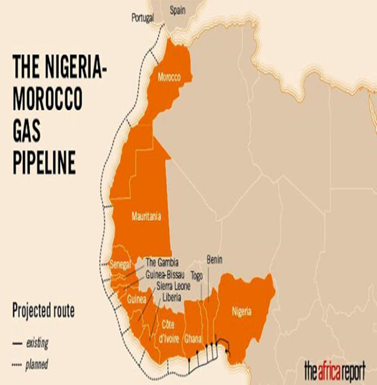
Source: The Africa Report, June 2022
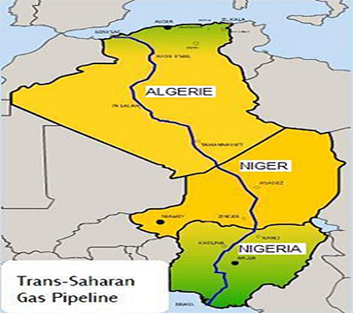
Source: Echorouk Online
Furthermore, as highlighted earlier, major European energy companies are also trying to increase their investments into the natural gas projects in Africa to boost LNG shipments into Europe. British Petroleum has decided to prioritise the Phase 1 of Yakaar–Teranga and BirAllah gas projects in Senegal and Mauritania respectively, in order to scale up gas production from these sites. The Yakaar-Teranga is a conventional ultra-deep water gas field, with a peak capacity of 500 Mmcdf, whose commercial production is expected to start from 2024.[xi] While the BirAllah gas project in Mauritania is expected to yield 2.5 million tons of natural gas per annum, starting from 2023. Located close to these two sites is the Greater Tortue Ahmeyim LNG project, being operated by British Petroleum. The project aims to start production from next year with an annual capacity of 2.5 MMT.[xii] London based Shell has planned to refocus on the $30 billion Tanzania LNG development project, which aims to build an LNG export terminal on the Indian Ocean coast, whereas Italian oil major ENI is planning to invest in the Coral FLNG project in Mozambique.[xiii]
The Rovuma LNG liquefaction Plant, located off the Cabo Delgado coast in northern Mozambique, is being constructed by energy major ExxonMobil and has a planned capacity of 15.2 million tons of LNG per year.[xiv] Additionally, France’s Total has recently stated that it seeks to restart the onshore Mozambique LNG development project with an annual production capacity of 12.8 million tons of LNG.[xv]
The following Map shows the location of the above-mentioned projects on the African map.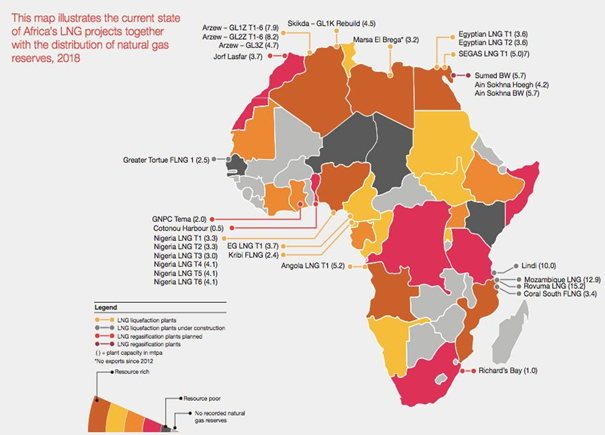
Source: Consultancy Africa
The above developments highlight that the EU as well as African member states are trying to increase collaborations in order to expedite energy supplies to the former. Both sides see this as a mutually beneficial exercise. While the EU looks towards a probable alternative to Russian energy imports, which is not easy to find given the scale of Russian supplies, the revenues of African states are likely to be boosted as international oil prices have been witnessing an upward trajectory in past few months. Africa’s response has been positive too. Countries like Nigeria have said that they are willing to ‘dramatically’ increase production to meet Europe’s increasing demand.[xvi] Mauritania’s Oil Minister in June 2022 said that Europe's move away from Russian gas provides a ready and lucrative market for the oil and gas projects being developed in West Africa.[xvii] Similarly, President of Senegal Macky Sall highlighted in May 2022 that Senegal would start substantial gas production by 2023 and subsequently supply LNG to the European market.[xviii]
Africa’s Potential
Africa has existing advantages which makes it uniquely positioned to cater to Europe’s energy needs. Africa has an estimated 221.6 trillion cubic feet of natural gas reserves which makes it well placed to ameliorate Europe’s energy woes. Within Africa; Nigeria, Algeria, and Mozambique account for most of the reserves.
Natural Gas Reserves in Africa as of 2021 (in trillion cubic feet)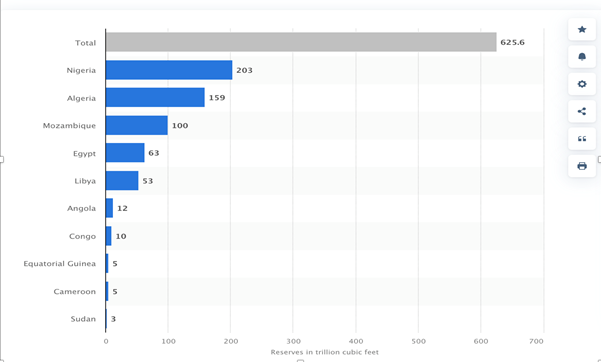
Source: Statista
In 2019, the EU imported about 108 billion cubic meters of LNG from Africa most of which were from Nigeria, Algeria and Morocco.[xix] North African gas exports meet around 7 percent of the total current European gas consumption (39.5 bcm). Hence, there is a lot of scope in further improving the export percentage to Europe. Moreover, as per reports in the media, the German-African Business Association has analysed that the African nations have more reserves than are needed for their domestic markets and hence the export potential to Europe is very high.[xx]
Additionally, Africa’s main advantage is that it already has existing transcontinental pipeline infrastructure in place which is connected with the wider European grid. The three pipelines between Africa and Europe are; the Transmed, from Algeria to Italy (via Tunisia), the Medgaz, from Algeria to Spain under the sea, and the Greenstream, which connects Libya to Sicily. Moreover, the new pipelines which are being discussed such as the TSGP and NMGP can effectively utilise the currently existing transcontinental gas pipeline grid. While the TSGP is planned to be integrated with the existing pipelines in Algeria like Medgaz and Transmed to transport gas to Europe, the NMGP aims to extend the existing West Africa Gas Pipeline (WAGP) all the way to Europe via West African coastal nations and Morocco.[xxi]
The Existing Transcontinental Pipeline Network between Africa and Europe
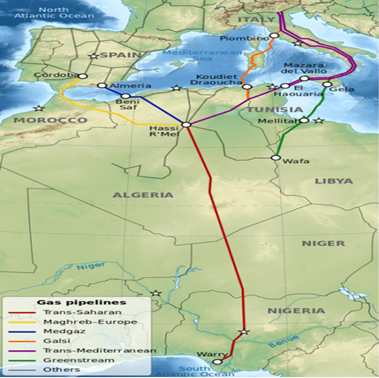
Source: Research Gate
Two significant projects that could also soon contribute to Europe’s gas needs are the ‘Tortue Development’ located on the maritime boundary between Senegal and Mauritania, which will become operational by 2023, and the ‘Hilli Episeyo’ project in Cameroon, operated by a company named Perenco. Parenco has further confirmed that it plans to increase production from the project in 2023.[xxii] While energy projects take time to become operational, the advantage with these two projects i.e., the Tortue Development and the Hilli Episeyo is that they would become operational within the next few months. Thus, the short-term energy requirements of Europe may be addressed to some extent. Moreover, Africa’s potential is further enhanced due to a number of upcoming energy start-ups and natural gas projects, operated by European energy majors, whose acceleration can result in increased energy delivery to Europe.
The following two tables list out these start-ups and projects.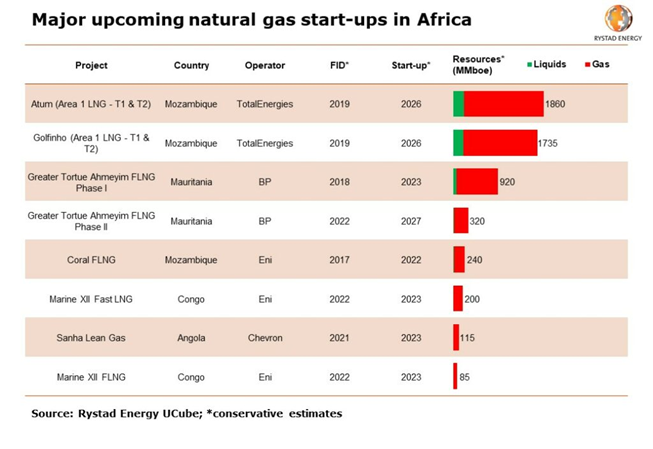
Source: Offshore Energy Outlook and Strategy, May 2022
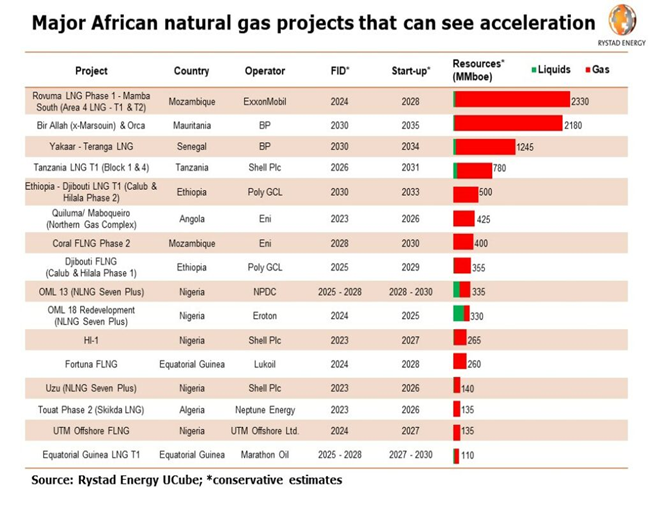
Source: Offshore Energy Outlook and Strategy, May 2022
Challenges
Despite the current negotiations and Africa’s high gas export potential, there are certain challenges which both Africa and Europe need to overcome. These are discussed below.
Europe, amidst increasing global threats from climate change and global warming, in the last few years, has been reluctant in funding gas projects in Africa in order to encourage Africa’s transition towards green energy.[xxiii] Given the sudden push again by Europe in diversifying its fossil fuel resources towards Africa, many leaders in African nations believe that ‘interests of Africa are not important for Europe’.[xxiv] The leaders argue that the reversals in energy policies towards Africa by Europe are done keeping only European requirements in mind. How this disaffection among the African leaders is addressed by Europe remains to be seen.
Furthermore, Europe’s commitment to carbon neutrality by 2050 would require it to start the process of phasing out fossil fuels from 2030 onwards.[xxv] This highlights that current European gas needs are more short term in nature. Countries like Nigeria feel that this short term increase in gas imports by Europe would be against long term interests of African economies since gas projects usually take time in becoming operationally viable.[xxvi] There is a risk that new gas infrastructure in Africa could become ‘stranded assets’, given that demand for gas may decline substantially by the time they are ready to serve European markets.[xxvii] Hence, there arises a mismatch between Europe’s objectives, which seem to be short term, and Africa’s upcoming gas projects with long gestation periods.
It must also be noted that there has been considerable lack of African governments’ investment in oil, gas and energy sectors. African governments have been unable to utilise the revenues from gas exports to further invest in ramping up production capacities. For example, the Bonny Island Plant in Nigeria has been consistently run at 20 percent below capacity in last few years. One of the reasons is that a large part of the revenue is diverted towards energy subsidies to keep fuel prices low in the domestic markets. This leaves little fiscal space for viable public sector investment in the energy sector. African countries have also been slow to act whenever new gas exploration opportunities have arisen due to complex government negotiations and approvals, which have resulted in long delays and many pending gas deals.[xxviii] Complex regulatory frameworks and multiplicity of laws act as hindrances to foreign investment and government to business (G2B) negotiations. On top of all this, theft of energy resources, red tapism and vandalism are also serious challenges to the industry.
The Sahel region is prone to violent conflict which threatens the security of energy resources as the gas pipelines criss-cross the region. Criminal activities like smuggling of drugs, weapons and human trafficking make the region highly prone to violence.[xxix] Furthermore, insurgencies in one country may spill across borders, as has been the case when conflict in northern and central Mali since 2012 spilled into north and eastern Burkina Faso and southwestern Niger.[xxx] It is therefore extremely important as well as challenging for the countries in the region to ensure the safety of energy resources and investments.
Apart from environmental, economic and security factors, there are certain political challenges as well. In November 2021, Algeria decided to close the Maghreb Europe Gas (MEG) Pipeline which links the HassiR’mel field in Algeria with Spain through Morocco. This was due to ongoing political tensions with Morocco over the dispute in Western Sahara. Morocco, in 2007, had proposed a limited autonomy plan for Western Sahara within the ambit of Moroccan sovereignty.[xxxi] Moreover, Spain, the former colonial power in Western Sahara, in March 2022, endorsed this Moroccan plan while deviating from its original position of backing a UN-sponsored referendum in Western Sahara.[xxxii] The United States had also backed Spain’s decision of endorsing the Moroccan autonomy plan for Western Sahara. In response, Algerian President Abdelmadjid Tebboune called Spain’s repositioning “unjustifiable” and towards “contributing directly to the degradation of the situation”.[xxxiii] The closure of the MEG pipeline since November 2021 had already substantially affected gas supplies to Spain following which only the Medgaz pipeline is being used to export gas to Spain from Algeria. Additionally, it may also be noted that Algeria has a strategic relationship with Moscow and is dependent on Russian defence industry for its requirements. Algeria now is attempting to strike a delicate balance between maintaining its defence relations and strategic partnership with Moscow and maintaining gas supplies to Spain in particular and Europe in general.[xxxiv] The extent to which these ongoing political and strategic complexities further affect the gas exports to Europe in the near future remain to be seen.
From Spain’s point of view, an alternative to the MEG pipeline could be the Nigeria Morocco Trans-African Gas (MNGP) Pipeline project, which has been discussed earlier. The project has recently been approved by the Nigerian government.[xxxv] The pipeline plans to export Nigerian natural gas to multiple West African nations and via Morocco to Europe.
Conclusion
To conclude, it can be argued that the Ukraine crisis has presented both opportunities as well as challenges for Europe and Africa in the energy sector. Africa seems to have the potential in meeting the European energy demand. However, it is essential for Europe to address African concerns and be willing to invest both capital as well as technology in Africa. At the same time, African countries also need to address the infrastructure bottlenecks and ramp up production capacities with sufficient investments. Lastly, the political disputes in the region need to be addressed so that crucial pipelines like the MEG are re-operationalised and start functioning again with enhanced capacity.
*****
* Kaushik Nag, Research Intern, Indian Council of World Affairs, Sapru House, New Delhi.
Disclaimer: The views are of the author.
Endnotes
[i] Kira Taylor (March 9, 2022), EU rolls out plan to slash Russian gas imports by two thirds before year end. https://www.euractiv.com/section/energy/news/eu-rolls-out-plan-to-slash-russian-gas-imports-by-two-thirds-before-year-end/. Accessed on 8th July, 2022.
[ii] Gerard Dipppo (June 22, 2022), Strangling the Bear? The Sanctions on Russia after Four Months. Washington DC. https://www.csis.org/analysis/european-union-prepares-ban-russian-oil. Accessed on 5th July 2022
[iii] International Energy Agency (April 30, 2022) Country Report: Russia.
https://www.iea.org/countries/russia. Accessed on 6th July 2022
[iv] Huileng Tan (April 18, 2022), Europe's reliance on Russian gas imports has become a problem amid the Ukraine war. Now, it's looking to Africa for alternatives. https://www.businessinsider.in/politics/world/news/europes-reliance-on-russian-gas-imports-has-become-a-problem-amid-the-ukraine-war-now-its-looking-to-africa-for-alternatives-/articleshow/90906883.cms. Accessed on 12th July, 2022.
[v]Africa News, (April 21, 2022), Italy signs gas deal with Angola in a bid to boycott Russia. https://www.africanews.com/2022/04/21/italy-signs-gas-deal-with-angola-in-a-bid-to-boycott-russia//. Accessed on 12th July, 2022.
[vi] ENI Press Release (21 April, 2022), The Republic of Congo and Eni agree to increase gas production and supply.
https://www.eni.com/en-IT/media/press-release/2022/04/republic-congo-and-eni-agree-increase-gas-production-supply.html. Accessed on 14th July, 2022.
[vii] Noah Browning (June 23, 2022), West Africa must grasp opportunity of Europe's shift from Russian gas. https://www.reuters.com/business/energy/west-africa-must-grasp-opportunity-europes-shift-russian-gas-2022-06-23/. Accessed on 13th July, 2022.
[viii] Jennifer Holleis, Martina Schwikowski (March 4, 2022), Europe looks to Africa to fill natural gas gap. Africa. https://www.dw.com/en/europe-looks-to-africa-to-fill-natural-gas-gap/a-61017873. Accessed on 10th July, 2022.
[ix]Al Jazeera (June 23, 2022), Algeria, Niger, Nigeria resume talks on Trans-Sahara gas pipeline.
https://www.aljazeera.com/news/2022/6/23/algeria-niger-nigeria-resume-talks-on-trans-sahara-gas-pipeline. Accessed on 15th July, 2022.
[x] Timothy Obiezu (June 39, 2022), Nigerian Experts Praise Trans-Saharan Gas Pipeline Project. https://www.voanews.com/amp/nigerian-experts-praise-trans-saharan-gas-pipeline-project-/6640152.html. Accessed on 16th July, 2022.
[xi]Carmen, Offshore Technology (April 28, 2022), Yakaar-Teranga Phase 1 Conventional Gas Field, Senegal. https://www.offshore-technology.com/marketdata/yakaar-teranga-phase-1-conventional-gas-field-senegal/. Accessed on 17th July, 2022.
[xii] S&P Global (November 9, 2021), Phase 2 of Greater Tortue Ahmeyim LNG project being reevaluated: official. https://www.spglobal.com/commodityinsights/en/market-insights/latest-news/energy-transition/110921-phase-2-of-greater-tortue-ahmeyim-lng-project-being-reevaluated-official. Accessed on 16th July, 2022.
[xiii] Ibid.
[xiv] Yahoo Finance (May 15, 2022), Europe Looks to African Gas to Reduce Dependence On Russian Imports. https://finance.yahoo.com/news/europe-looks-african-gas-reduce-210000363.html?guccounter=1. Accessed on 14th July, 2022.
[xv] Offshore Energy (February 1, 2022), Total Energies to resume Mozambique LNG project in 2022.
https://www.offshore-energy.biz/totalenergies-to-resume-mozambique-lng-project-in-2022/. Accessed on 18th July, 2022.
[xvi] Benjamin Fox (March 28, 2022), Nigeria offers to plug EU’s Russian gas supply gap, EURACTIV.
https://www.euractiv.com/section/energy-environment/news/nigeria-offers-to-plug-eus-russian-gas-supply-gap/. Accessed on 14th July, 2022.
[xvii] Noah Browning (June 23, 2022), West Africa must grasp opportunity of Europe's shift from Russian gas. https://www.reuters.com/business/energy/west-africa-must-grasp-opportunity-europes-shift-russian-gas-2022-06-23/. Accessed on 13th July, 2022.
[xviii] Energy News (May 23, 2022), Germany: Gas Discussions with Senegal. https://energynews.pro/en/germany-gas-discussions-with-senegal/. Accessed on 15th July, 2022.
[xix] Ibid.
[xx] Deutsche Welle (March 22, 2022), Explained: Can Africa supply Europe's energy demand?
https://frontline.thehindu.com/dispatches/explained-can-africa-supply-europes-energy-demand/article65273979.ece. Accessed on 13th July, 2022.
[xxi] Yahoo Finance (May 15, 2022), Europe Looks to African Gas to Reduce Dependence On Russian Imports.
https://finance.yahoo.com/news/europe-looks-african-gas-reduce-210000363.html?guccounter=1. Accessed on 14th July, 2022.
[xxii] Ben Payton (May 17, 2022), Europe’s Energy Crisis: Will Africa Ride to the Rescue? Africa.
https://african.business/2022/05/energy-resources/europes-energy-crisis-will-africa-ride-to-the-rescue/. Accessed on 11th July, 2022.
[xxiii]NJ Ayuk (March 15, 2022), Perspective: Africa’s 'Freiheits Gas' can help Europe overcome dependence on Russian gas. Johannesburg.
https://www.worldoil.com/news/2022/3/15/perspective-africa-s-freiheits-gas-can-help-europe-overcome-dependence-on-russian-gas/. Accessed on 14th July, 2022.
[xxiv] Ibid.
[xxv] Ben Payton (May 17, 2022), Europe’s Energy Crisis: Will Africa Ride to the Rescue? Africa.
https://african.business/2022/05/energy-resources/europes-energy-crisis-will-africa-ride-to-the-rescue/. Accessed on 11th July, 2022.
[xxvi] Ibid.
[xxvii] Ibid.
[xxviii] NJ Ayuk (March 15, 2022), Perspective: Africa’s 'Freiheits Gas' can help Europe overcome dependence on Russian gas. Johannesburg. https://www.worldoil.com/news/2022/3/15/perspective-africa-s-freiheits-gas-can-help-europe-overcome-dependence-on-russian-gas/. Accessed on 14th July, 2022.
[xxix] World Economic Forum (January 23, 2019), The Sahel is engulfed by violence. Climate change, food insecurity and extremists are largely to blame.
https://www.weforum.org/agenda/2019/01/all-the-warning-signs-are-showing-in-the-sahel-we-must-act-now/. Accessed on 12th July, 2022.
[xxx] Ibid.
[xxxi] Indian Express (July 19, 2022), Explained: What is the Western Sahara dispute that has now strained Algeria-Spain ties? New Delhi.
https://indianexpress.com/article/explained/western-sahara-dispute-algeria-spain-ties-explained-7982930/lite/. Accessed on 19th July, 2022.
[xxxii] Ibid.
[xxxiii] Ibid.
[xxxiv] Giorgio Cafiero (June 9, 2022), Algeria plays balancing act as Europe tries cut Russian gas.
https://www.aljazeera.com/news/2022/6/9/algerias-growing-importance-to-italy. Accessed on 14th July, 2022.
[xxxv]Africa News (June 2, 2022), Nigeria approves proposal for gas pipeline project to Morocco, Nigeria.
https://www.africanews.com/2022/06/02/nigeria-approves-proposal-for-gas-pipeline-project-to-morocco//. Accessed on 15th July, 2022.















